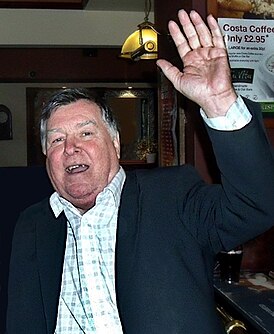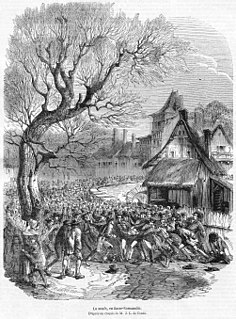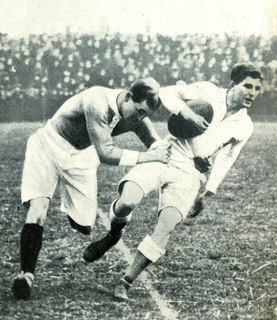Notes
- ↑ Official RFU History Woolgar
| History | |||||||||||||||||
|---|---|---|---|---|---|---|---|---|---|---|---|---|---|---|---|---|---|
| Players | |||||||||||||||||
| Home stadiums | |||||||||||||||||
| Competitions and trophies | |||||||||||||||||
| Related teams | |||||||||||||||||
| Matches |
| ||||||||||||||||
| Tours |
| ||||||||||||||||
| See also | |||||||||||||||||
These are the list of results that England have played from 1871 to 1879.
The first international in international rugby football history was played between Scotland and England at Raeburn Place, in Edinburgh on 27 March 1871. Scotland prevailed by one goal and try to England's one try . A standard points scoring system was at the time undeveloped .
| Opposing Teams | For | Against | Date | Venue | Status |
|---|---|---|---|---|---|
| Scotland | 1T | 1G 1T | 27/03/1871 | Raeburn Place, Edinburgh | Test Match |
| Opposing Teams | For | Against | Date | Venue | Status |
|---|---|---|---|---|---|
| Scotland | 1G 1DG 2T | 1DG | 05/02/1872 | Kennington Oval, London | Test Match |
| Opposing Teams | For | Against | Date | Venue | Status |
|---|---|---|---|---|---|
| Scotland | 0 | 0 | 03/03/1873 | Hamilton Crescent, Glasgow | Test Match |
| Opposing Teams | For | Against | Date | Venue | Status |
|---|---|---|---|---|---|
| Scotland | 1DG | 1T | 23/02/1874 | Kennington Oval, London | Test Match |
| Opposing Teams | For | Against | Date | Venue | Status |
|---|---|---|---|---|---|
| Ireland | 1G 1T 1DG | 0 | 15/02/1875 | Kennington Oval, London | Test Match |
| Scotland | 0 | 0 | 20/03/1875 | Raeburn Place, Edinburgh | Test Match |
| Ireland | 1G 1T | 0 | 13/12/1875 | Rathmines, Dublin | Test Match |
| Opposing Teams | For | Against | Date | Venue | Status |
|---|---|---|---|---|---|
| Scotland | 1G 1T | 0 | 06/03/1876 | Kennington Oval, London | Test Match |
| Opposing Teams | For | Against | Date | Venue | Status |
|---|---|---|---|---|---|
| Ireland | 2G 2T | 0 | 05/02/1877 | Kennington Oval, London | Test Match |
| Scotland | 0 | 1DG | 05/03/1877 | Raeburn Place, Edinburgh | Test Match |
| Opposing Teams | For | Against | Date | Venue | Status |
|---|---|---|---|---|---|
| Scotland | 0 | 0 | 04/03/1878 | Kennington Oval, London | Test Match |
| Ireland | 2G 1T | 0 | 11/03/1878 | Lansdowne Road, Dublin | Test Match |
| Opposing Teams | For | Against | Date | Venue | Status |
|---|---|---|---|---|---|
| Scotland | 1G | 1DG | 10/03/1879 | Raeburn Place, Edinburgh | Test Match |
| Ireland | 2G 2T 1DG | 0 | 24/03/1879 | Kennington Oval, London | Test Match |

Barry John is a former Welsh rugby union fly-half who played, during the amateur era of the sport, in the 1960s, and early 1970s. John began his rugby career as a schoolboy playing for his local team Cefneithin RFC before switching to first-class west Wales team Llanelli RFC in 1964. It was while at Llanelli that John was first selected for the Wales national team, a shock selection as a replacement for David Watkins to face a touring Australian team.

The history of rugby union follows from various football games long before the 19th century, but it was not until the middle of that century that the rules were formulated and codified. The code of football later known as rugby union can be traced to three events: the first set of written rules in 1845, the Blackheath Club's decision to leave the Football Association in 1863 and the formation of the Rugby Football Union in 1871. The code was originally known simply as "rugby football". It was not until a schism in 1895, over the payment of players, which resulted in the formation of the separate code of rugby league, that the name "rugby union" was used to differentiate the original rugby code. For most of its history, rugby was a strictly amateur football code, and the sport's administrators frequently imposed bans and restrictions on players who they viewed as professional. It was not until 1995 that rugby union was declared an "open" game, and thus professionalism was sanctioned by the code's governing body, World Rugby—then known as the International Rugby Football Board (IRFB).

The England national rugby league team represents England in international rugby league.
The Scotland national rugby league team represent Scotland in international rugby league football tournaments. Following the break-up of the Great Britain team in 2008, Scottish players play solely for Scotland, apart from occasional Southern Hemisphere tours, for which the Great Britain team is expected to be revived. The team is nicknamed the Bravehearts.
The 2006 Churchill Cup was a rugby union competition played between the second teams of various top tier international rugby nations and the first teams of traditionally less prominent teams, such as Canada and the United States. The 2006 tournament began on June 3 and ended on June 17. The 2006 competition marked the fourth year of the Churchill Cup as well as its expansion from four to six teams. The Cup was contested by Canada, England Saxons, Ireland A, New Zealand Māori, Scotland A, and the United States. New Zealand Māori won the competition.
This first tour undertaken by England to South Africa was organised with a demanding schedule, although with only one Test Match. Within two weeks and three days, seven matches were to be played, the first four at sea level, and the final three, including the Test Match, at the altitude in the highveld with only two days to acclimatise before a demanding fixture against Northern Transvaal. From the outset, under captain John Pullin and the management of Alec Lewis and John Elders, there was a buoyant and optimistic spirit in the squad, as if they were determined to erase the memories of the last few seasons of undistinguished English performances.

Rugby union in Scotland in its modern form has existed since the mid-19th century. As with the history of rugby union itself however, it emerged from older traditional forms of football which preceded the codification of the sport. In the same manner as rugby union in England, rugby union in Scotland would grow at a significant rate to the point where Scotland played England in the first ever rugby union international in 1871, a match which was won by the Scottish team.
The 1975–76 Australia rugby union tour of Britain and Ireland was a series of matches played by the Australia national rugby union team. The team was referred to as the "Sixth Wallabies", although they were actually only the fifth Australian touring team to undertake a full tour of Britain & Ireland; the "Second Wallabies" of 1939–40 had to return home without playing a game when the World War II broke out.

The rugby union match played between Scotland and England on 27 March 1871 was the world's first international rugby match. The match was played at Raeburn Place, Edinburgh in front of 4,000 spectators. Scotland won the match, scoring two tries and a goal to England's single try.

William Cross was a Scotland international rugby union player.

The England rugby union try record progression charts the record number of tries scored for the England national rugby union team by individual players, or rugby footballers as they are still sometimes referred to.
The 1988 Australia rugby union tour of England, Scotland and Italy was a series of fifteen matches played by the Australia national rugby union team in England, Scotland and Italy from October to December 1988. The Wallabies won eleven of their matches and lost the other four; they lost to England in their first international match but beat Scotland in the second and concluded the tour with a further international win over Italy.
The 1971 England rugby union tour of Far East was a series of matches played between September and October by an English national selection in Asia, as part of the RFU’s centenary celebrations. None of the six international matches on this tour were given official Test status, with England playing as England XV, No 'caps' were awarded to the English players who took part on the tour.
The 1982 Fiji rugby union tour of Great Britain and Canada was a series of matches played between September and October 1982 and by Fiji national rugby union team, in Scotland, England and Canada.